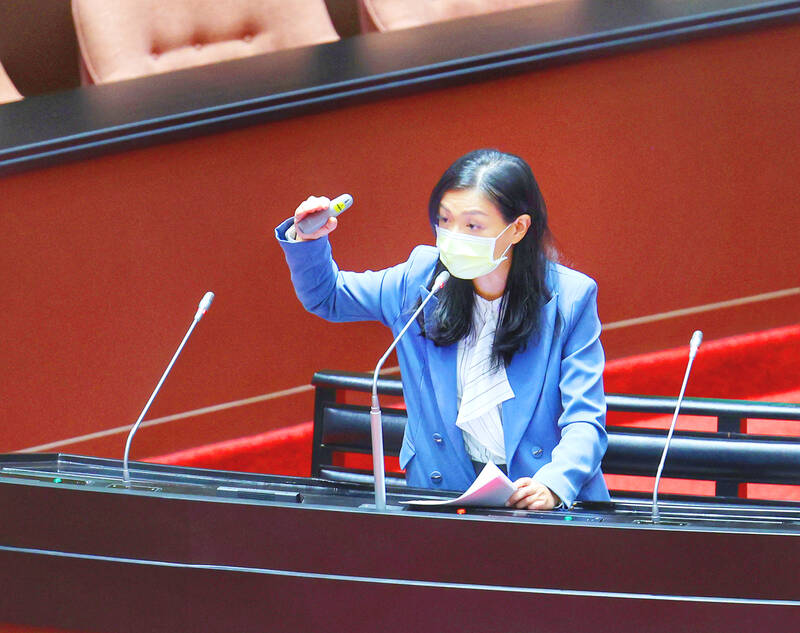Judicial agencies yesterday said they are investigating Taiwan People’s Party (TPP) Legislator Ann Kao (高虹安) over allegations of pocketing her assistants’ wages, accepting illegal political donations and other corrupt practices.
Kao is running for Hsinchu City mayor in the Nov. 26 local elections.
The Ministry of Justice Investigation Bureau (MJIB) said that it has interviewed persons of interest and is assessing materials related to the case.

Photo: CNA
Bureau officials pledged to remain impartial and neutral as tensions rise in the run-up to the elections.
The Hsinchu District Prosecutors’ Office separately said it has launched its own investigation after receiving complaints relating to the case.
Hsinchu City Councilor Lin Keng-jen (林耕仁), the Chinese Nationalist Party’s (KMT) Hsinchu mayoral candidate, provided most of the materials against Kao, saying they were passed on to him by whistle-blowers from within the TPP and people familiar with Kao’s legislative office.
Lin has said that Kao hired Lee Chung-ting (李忠庭), her reported boyfriend, as an assistant, even though he held another high-paying job at the same time.
Lee had an annual salary of NT$6 million (US$188,070), receiving NT$500,000 in monthly payments from the Yonglin Foundation, Lin said, citing whistle-blowers.
The foundation is a charity organization funded and managed by Hon Hai Precision Industry Co founder Terry Gou (郭台銘) and his wife, Delia Tseng (曾馨瑩).
A Mirror Media magazine report on the materials provided by whistle-blowers said that Kao’s office assistants transferred part of their salaries and overtime wages to Kao’s private account.
The money was used to pay for meals, banquets for political figures, drinks and snacks for the office, as well as Kao’s hair salon visits and personal shopping, Mirror Media said.
Lin accused Kao of wage fraud, as Lee was working at another job, but still received an assistant’s wage and claimed nearly maximum overtime pay each month.
Kao and Lee allegedly used public funds for private use, Mirror Media reported, citing whistle-blowers.
They could face charges of contravening the Political Donations Act (政治獻金法) and conflict of interest for allegedly accepting financial contributions to push for legal amendments in favor of Hon Hai, it said.
Lin yesterday reportedly canceled a plan to visit the MJIB’s office in New Taipei City to present more evidence, after the KMT leadership asked him to stop “attacking” Kao.
Taipei Mayor Ko Wen-je (柯文哲), who is also the TPP’s chairman, said Lin canceled the visit because he wanted to backpedal from “bogus information” and had come under political pressure.
“Lin’s smear campaign against Kao has gone too far and has been done in poor taste. He should first prove that the information is correct and must reveal the source of the information,” Ko said.
Lin said that as a mayoral candidate, he has the right to question allegations of corruption and illegal activity by another candidate, which is for the good of Hsinchu City residents.
Following the allegations, Kao checked herself into a hospital for treatment on Tuesday night and canceled yesterday’s campaign activities.
Kao left the hospital later in the day and was photographed during a meeting with KMT Hsinchu County Commissioner Yang Wen-ko (楊文科) and United Microelectronics Corp honorary deputy chairman John Hsuan (宣明智), who has been backing Kao.

The Grand Hotel Taipei on Saturday confirmed that its information system had been illegally accessed and expressed its deepest apologies for the concern it has caused its customers, adding that the issue is being investigated by the Ministry of Justice Investigation Bureau. The hotel said that on Tuesday last week, it had discovered an external illegal intrusion into its information system. An initial digital forensic investigation confirmed that parts of the system had been accessed, it said, adding that the possibility that some customer data were stolen and leaked could not be ruled out. The actual scope and content of the affected data

‘LIKE-MINDED PARTNER’: Tako van Popta said it would be inappropriate to delay signing the deal with Taiwan because of China, adding he would promote the issue Canadian senators have stressed Taiwan’s importance for international trade and expressed enthusiasm for ensuring the Taiwan-Canada trade cooperation framework agreement is implemented this year. Representative to Canada Harry Tseng (曾厚仁) in an interview with the Central News Agency (CNA) said he was increasingly uneasy about Ottawa’s delays in signing the agreement, especially as Ottawa has warmed toward Beijing. There are “no negotiations left. Not only [is it] initialed, we have three versions of the text ready: English, French and Mandarin,” Tseng said. “That tells you how close we are to the final signature.” Tseng said that he hoped Canadian Prime Minister Mark Carney

POSITIVE DEVELOPMENT: Japan and the US are expected to hold in-depth discussions on Taiwan-related issues during the meeting next month, Japanese sources said The holding of a Japan-US leaders’ meeting ahead of US President Donald Trump’s visit to China is positive news for Taiwan, former Japan-Taiwan Exchange Association representative Hiroyasu Izumi said yesterday. After the Liberal Democratic Party’s landslide victory in Japan’s House of Representatives election, Japanese Prime Minister Sanae Takaichi is scheduled to visit the US next month, where she is to meet with Trump ahead of the US president’s planned visit to China from March 31 to April 2 for a meeting with Chinese President Xi Jinping (習近平). Japan and the US are expected to hold in-depth discussions on Taiwan-related issues during the

President William Lai (賴清德) yesterday bestowed one of Taiwan’s highest honors on Saint Vincent and the Grenadines (SVG) Ambassador Andrea Clare Bowman in recognition of her contributions to bilateral ties. “By conferring the Order of Brilliant Star with Grand Cordon on Ambassador Bowman today, I want to sincerely thank her, on behalf of the Taiwanese people, for her outstanding contribution to deepening diplomatic ties between Taiwan and SVG,” Lai said at a ceremony held at the Presidential Office in Taipei. He noted that Bowman became SVG’s first ambassador to Taiwan in 2019 and